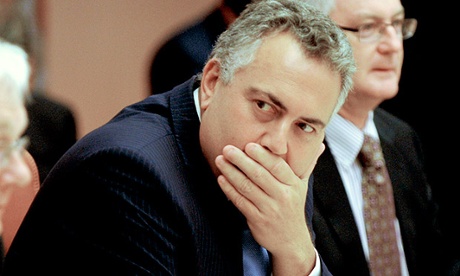Six ways to fix Australia's finances without cuts
Budgets
are statements of priorities and this government has made its clear:
concessions for the rich, cuts for the rest. Here's six fair ways to
improve the state of the Commonwealth's books.
• How would you cut Australia's deficit? - interactive
are statements of priorities and this government has made its clear:
concessions for the rich, cuts for the rest. Here's six fair ways to
improve the state of the Commonwealth's books.
• How would you cut Australia's deficit? - interactive

Governments have the power to make grand schemes happen, and their
budgets indicate their priorities. The question for prime minister Tony
Abbott and treasurer Hockey this budget is who will get what, when and
how?
In the lead up to the budget the public has been told
that cuts are necessary. The commission of audit and the government have
made some very spurious arguments to justify the cuts, which Greg
Jericho described as "ideology over evidence".
So what might a fairer budget look like? Here's six ways we can find more money without cuts.
1. End the great superannuation concession rort – save $10.5bn
Here's a popular cut: end the huge cash giveaways to the wealthy through superannuation tax concessions.For every $1bn we spend on concessions, we save only $200m on the old
age pension. This is a massive net loss for the government and a
redistribution of wealth from the state to the already well off, because
30% of concessions
go to the top 5%. The top 1% receives more than three times as much as
the old age pension – the programme it was intended to replace. Ending
the concessions for the top 5% alone would save $10.5bn annually; a more
radical restructuring would save a lot more.
2. Actually tax the mining industry – add $50bn
Mining operations in Australia are comparatively undertaxed. The effective taxation on resources in Australia is 13%, while in Norway it's 78%. In 2010-11, the value of mining exports was $135.6bn, meaning the total tax was approximately $17.6bn. If the effective tax increased to Norwegian rates, it would accrue $105.8bn.Perhaps
that’s too radical for Australians, who are used to being exploited by
majority foreign owned mining companies. How about a 50% tax rate for
our Crown-owned minerals? We could pocket a neat $67.8bn. The difference
would more than cover the $47bn deficit.
3. Abolish fossil fuel subsidies – save $11bn
In 2013-14 there were over $11bnof subsidies given to the fossil fuel sector. This includes $6bn for
fuel tax credits, $1bn for aviation fuel, and lots of smaller subsides,
like $0.5bn for mining exploration. This is a wealth transfer to
polluting companies which should be cut.
4. Defund private schools – save $9bn
In 2013-14 the Commonwealth spent $4.5bn on public schools and $9bn on private schools. I've argued beforethat private schools shouldn't receive federal funding, as those
students have opted out of the public provision of education provided by
the states. Cutting that $9bn spent on private schools – or
transferring that money to public schools – would end the wasteful elite
private school "arms race" where unfathomable amounts have been spent on gyms, pools and the like.
That aside, private schools are less efficient increasing their costs per student by 3.4% per annum compared to 2.4% per annum for public schools – with no improvement to academic results.
Any neoliberal would tell you that such spending is wasteful and
inefficient, because the input costs are greater for the same academic
return - studies found that NAPLAN scores didn't improve for students
who attended private or Catholic schools.
5. More progressive income taxes – add $41bn
Thereal causes of the deficit are cuts to income tax and the disappearance
of a more progressive taxation system. If 2006 taxation rates were
still used, there would be an additional $40bn of revenue this year - let's restore them. The Greens have also proposed a millionaires’ tax, which would raise $1bn
by taking an extra 5% from the very richest. Why stop at 50% for
millionaires, when in 1985-86 people making what would now be $92,351
were taxed 60%? France recently adopted a 75% tax on millionaires; the Australian Greens are much tamer with their meagre 50% tax.
6. Abolish negative gearing – save $15bn
Australiahas a curious loophole in its tax code, which allows an investor to
borrow money to buy an asset, even if the income generated by that asset
does not initially cover the interest on the loan. Losses from
so-called "negatively geared" property is income tax deductible; it is
difficult to calculate how much negative gearing costs the budget but it
has been estimated to be about $15bn.
This is blatant welfare for those who are already very wealthy and
should be ended. It is government policy that does not improve housing
affordability, as was its initial aim, but increases wealth
inequalities.
The bottom line - $136.5bn improvement
My $136.5bn improvement isn't exhaustive, but it is enough to pay the $114bnfor a high speed rail network and save jobs at the ABC. I’ve had my
fun, now you be the treasurer. What would your budget priorities be?
Comment your recommendations to Hockey.


No comments:
Post a Comment